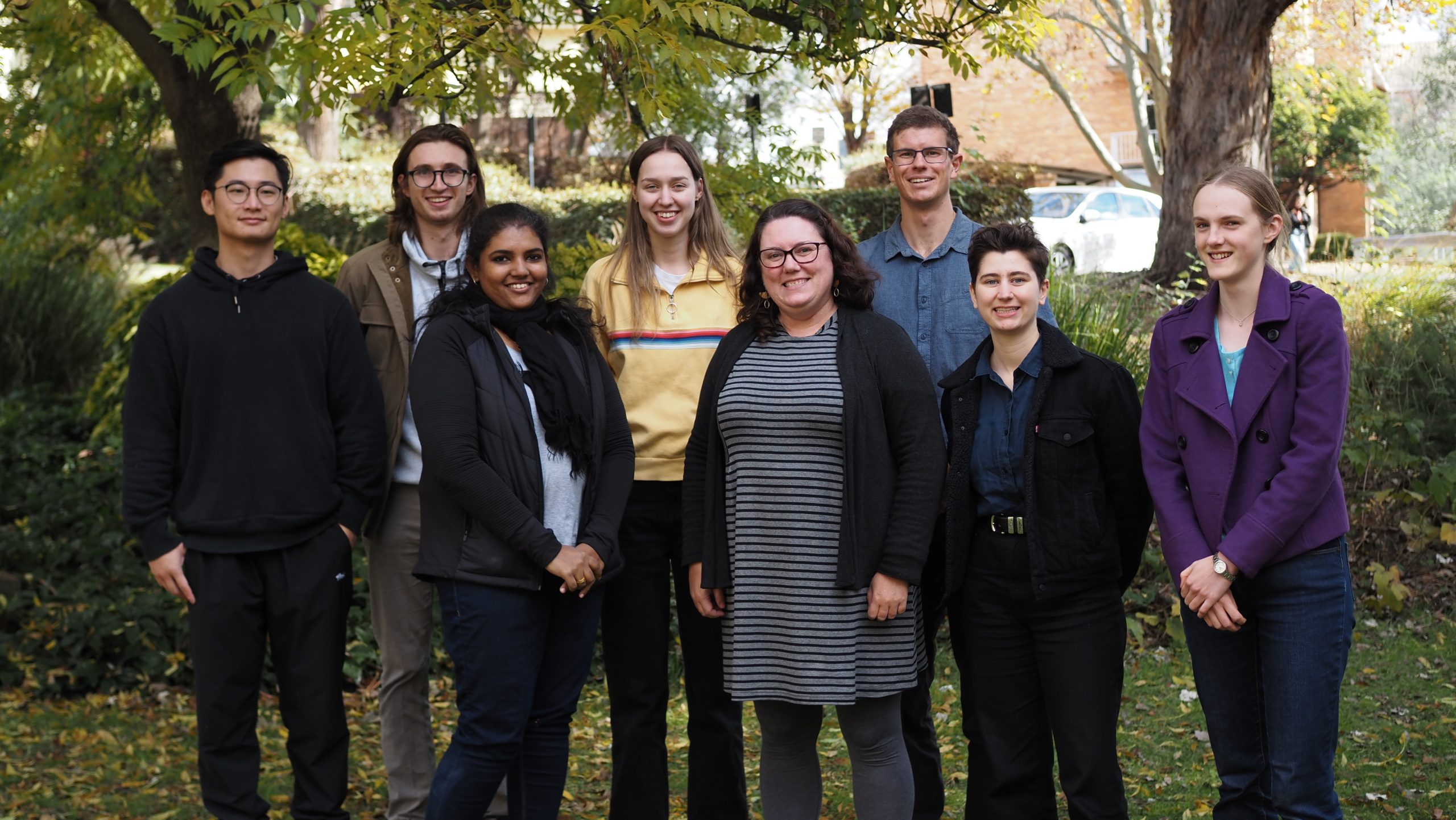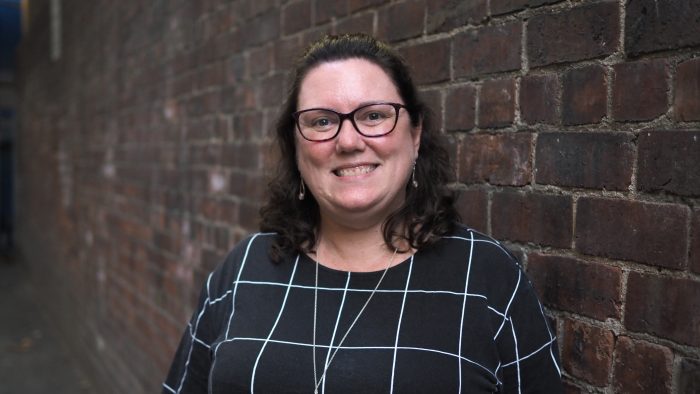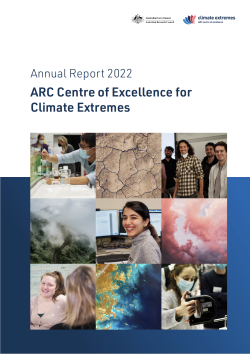
Researcher Development Program
The Researcher Development Program at the Australian Research Council Centre of Excellence for Climate Extremes develops national capacity in climate science by training and mentoring the next generation of researchers. It equips them with the intellectual and technical capacity required to take on the research challenges of the future. The program, which involves all Centre researchers, covers fundamental research and communications skills, professional development, mentoring and leadership opportunities.
In 2022 we welcomed 20 new honours and masters students and 23 PhD students to the Centre. All have been actively involved in our graduate activities.
We had 39 students submit this year (21 PhD and 18 honours/masters) and they are working in a variety of sectors. Of our graduating PhD students, half have moved on to positions in universities, 30 percent have taken up positions in research institutions, and the remainder are split between government and industry, including data sciences, insurance companies and environmental consultancies.
Our Researcher Development Program recognises that climate scientists come from a variety of undergraduate backgrounds and come to us with a varying range of skills and knowledge. Therefore, the program offers important breadth and depth of climate science knowledge, technical and communications training and professional development. In 2022 we packaged our bespoke training and development opportunities into a personalised training needs analysis and training plan. The latter was developed in consultation with all facets of the Centre. This included workshops co-designed by students and early career researchers (ECRs) and implementation of feedback from Centre researchers, Partner Organisations and Centre alumni and their employers.
Each commencing ECR is tasked with undertaking personal training needs analysis to assess their skills and knowledge base. This analysis reveals the skills and knowledge they may need to develop or acquire for successful completion of their project and to prepare for their next career step. Once this analysis is complete, students develop their individualised training in consultation with their supervisors. This training plan then becomes a living document – revisited throughout their time with the Centre – and is revisited at least annually.
After two years online, our popular and successful scientific paper writing workshops moved back to three-day, in-person events. The workshops provide participants with the skills and confidence to write scientific papers for successful publication in leading scientific journals.The success of our writing workshops can be seen in our publication numbers, with 75 papers published by Centre students this year 62 as first author). Included in this impressive publication list was a first-author paper in Science, by Hooman Ayat, on rapid rain bursts over Sydney, along with groundbreaking work led by student Zoe Gillett in The Journal of Atmospheric Sciences on Indian Ocean Teleconnections and a noteworthy paper by Danielle Udy in Nature-family journal Communications Earth and Environment.
In collaboration with our Computational Modelling Systems team, technical training opportunities this year have included weekly technical training sessions delivered via our videoconferencing system. This includes regular “code break” sessions, offered both online and on a drop-in basis, to replace lost in-person interactions due to Covid-19.
Our students and ECRs are represented in the Centre via our Early Career Researcher Committee. The committee provides formal and informal communication channels between ECR members and the Centre Executive Committee. The committee’s mission is to facilitate, encourage and contribute to the development of all Centre ECRs. This year, our Early Career Researcher Committee led efforts to advocate for increases to PhD stipends and student financial support.
Climate science students come from a range of quantitative undergraduate degree backgrounds. To ensure undergraduate students are aware of the opportunities within the climate sciences, we offer highly competitive undergraduate scholarships. In 2022 we welcomed 16 undergraduate students to work with us on research projects. The scholarships provide the students with an introduction to cutting-edge climate science research at one of the Centre’s five member universities or one of our national Partner Organisations. Undergraduate students are supervised by our ECRs, giving them vital supervisory experience.
Winter School 2022 – Ocean and Atmosphere Dynamics
Our winter schools are the cornerstone of our graduate program. We want to have graduate students who not only have highly specialised knowledge in their own area of research, but also a broad understanding of the discipline as a whole. The winter school provides this opportunity. The theme of the winter school changes each year and shifts from broader, relevant-to-everyone topics to more focused topics requiring prerequisite knowledge.
In 2022 our winter school covered atmosphere and ocean dynamics – with the help of the ANU Research School of Earth Sciences Geophysical Fluid Dynamics lab. Participants also visited the National Computational Infrastructure (NCI) to learn more about the supercomputer Gadi and the data visualisation support that NCI provides.
As our first in-person event since Covid-19 lockdowns, the winter school week started with a large cheer. This excitement continued throughout the week as graduate students had the opportunity to learn from leaders in the field and to engage with their peers.
Postdoctoral development
Our postdoctoral researchers were provided targeted development opportunities in 2022 via a postdoc workshop focusing on collaboration and communications skills, as well as monthly postdoctoral development sessions covering topics from networking to training to become a supervisor.
Science Fundamentals Lectures
In 2022 the Centre of Excellence also started a series of online science fundamentals lectures. The objective of these lectures was to provide additional breadth of knowledge for our graduate students and postdoctoral researchers. Interestingly, their reach extended well beyond our ECRs, with lectures often including many Chief Investigators and Partner Organisation members coming along to brush up on their fundamentals. Given the success of these lectures, they will continue on for the remainder of the Centre’s existence.
Finally, we celebrate the success of our students in winning a wide range of prizes and awards. The 2022 recipients included:
Chiara Holgate – named as a 2022 STA Superstar of STEM
Ariaan Purich – winner of the AMOS Meyers Medal
Josue Martinez Moreno – winner of the AMOS Uwe Radok Award for best PhD thesis
Celebrating Graduate Director Associate Professor Melissa Hart

Associate Professor Melissa Hart has been the heart of the Researcher Development Program since the inception of the ARC Centre of Excellence for Climate Extremes, in 2017. Before that, she held the position of Graduate Director in the ARC Centre of Excellence for Climate System Science, from 2011 to 2017.
Associate Prof Hart has overseen the development of more than 300 researchers at our Centre and has delivered more than 30 workshops and training opportunities so far. She has done this work while also still making important contributions to research on urban environments and working with schools through projects like the Schools Weather and Air Quality project.
‘Throughout my Masters, PhD and postdoc, Melissa has been a foundation for me. Her optimistic, unfaltering support has provided me with a constancy throughout the ups and downs of academic life that I am incredibly grateful for.’
– Dr Chiara Holgate
‘Leadership is not about titles, it’s about the impact you have on others. In my experience as a former student and current postdoctoral researcher at the Centre, Melissa has been a true champion of my career growth and development. I see her as an example of a leader who leads with integrity and compassion.’
– Dr Sanaa Hobeichi
‘When I think about Melissa, I think of happiness, kindness, intelligence, helpful, hard working…when I realised that she also supervises students and is doing all the activities of a professor, I was even more amazed by her. I think we are glad to have someone like her in the Centre, being so dedicated and so human.’
– Estefania Montoya Duque
‘I had a great experience supporting Melissa in aspects of the Researcher Development Program. She is an extremely pleasant and fun person to work with, and I think the ECRs in the Centre are very lucky to have her!’
– Dr Jules Kajtar
‘Melissa brings enthusiasm and boundless passion into developing the next generation of climate scientists, while also being a leading researcher in urban climate science.’
– Dr Kimberley Reid
We thank Associate Prof Melissa Hart for her hard work and success supporting hundreds of Australia’s current and future climate scientists.
ARC Centre of Excellence for Climate Extremes – Annual Report 2023
From the Chair of the Advisory Board
Climate Science Leaders of the Future
Weather and Climate Interactions Research Program
Attribution and Risk Research Program
Ocean Extremes Research Program
Computational Modelling Systems
Governance, Management and our Commitment to Equity, Diversity and Inclusion

